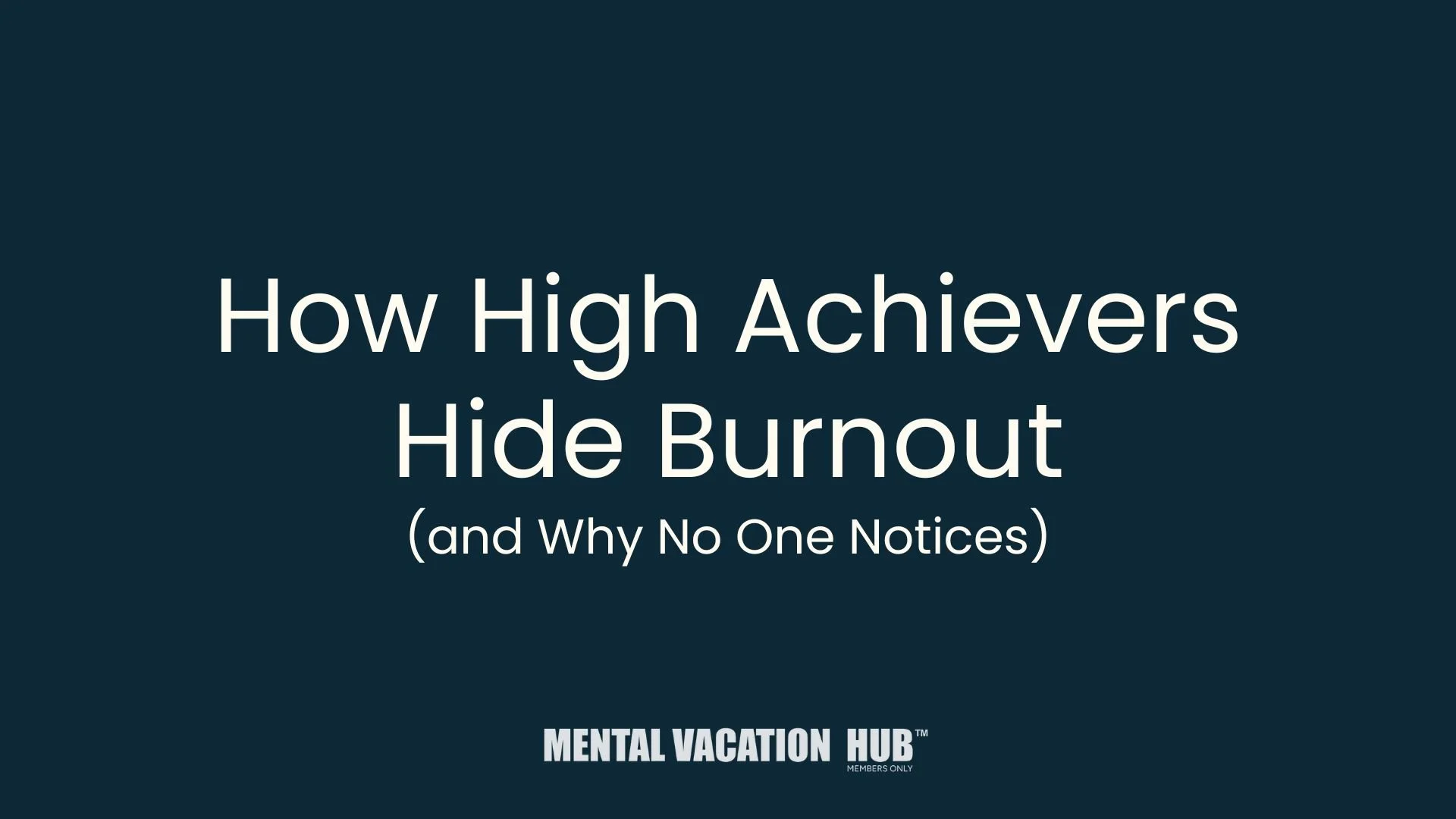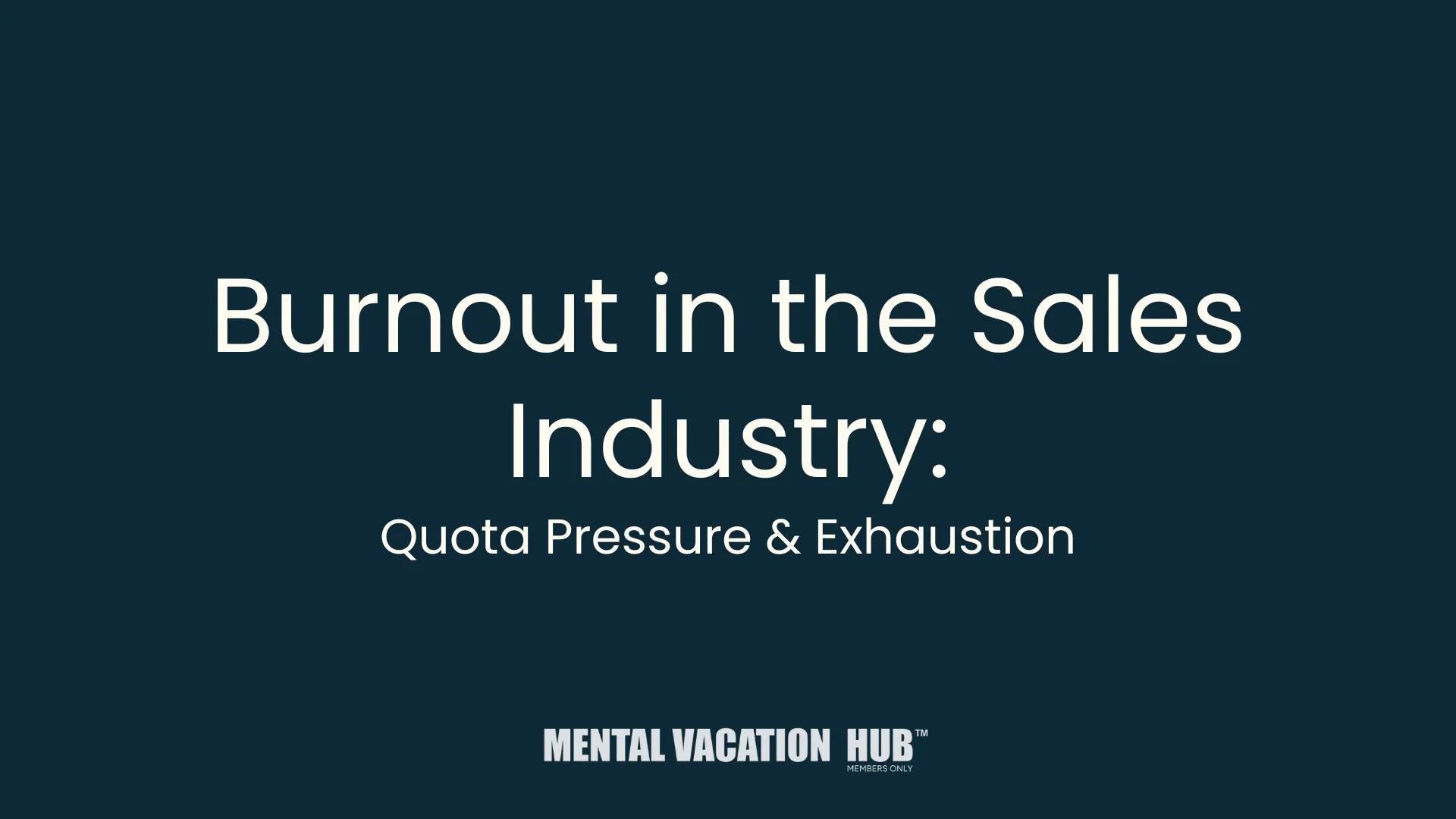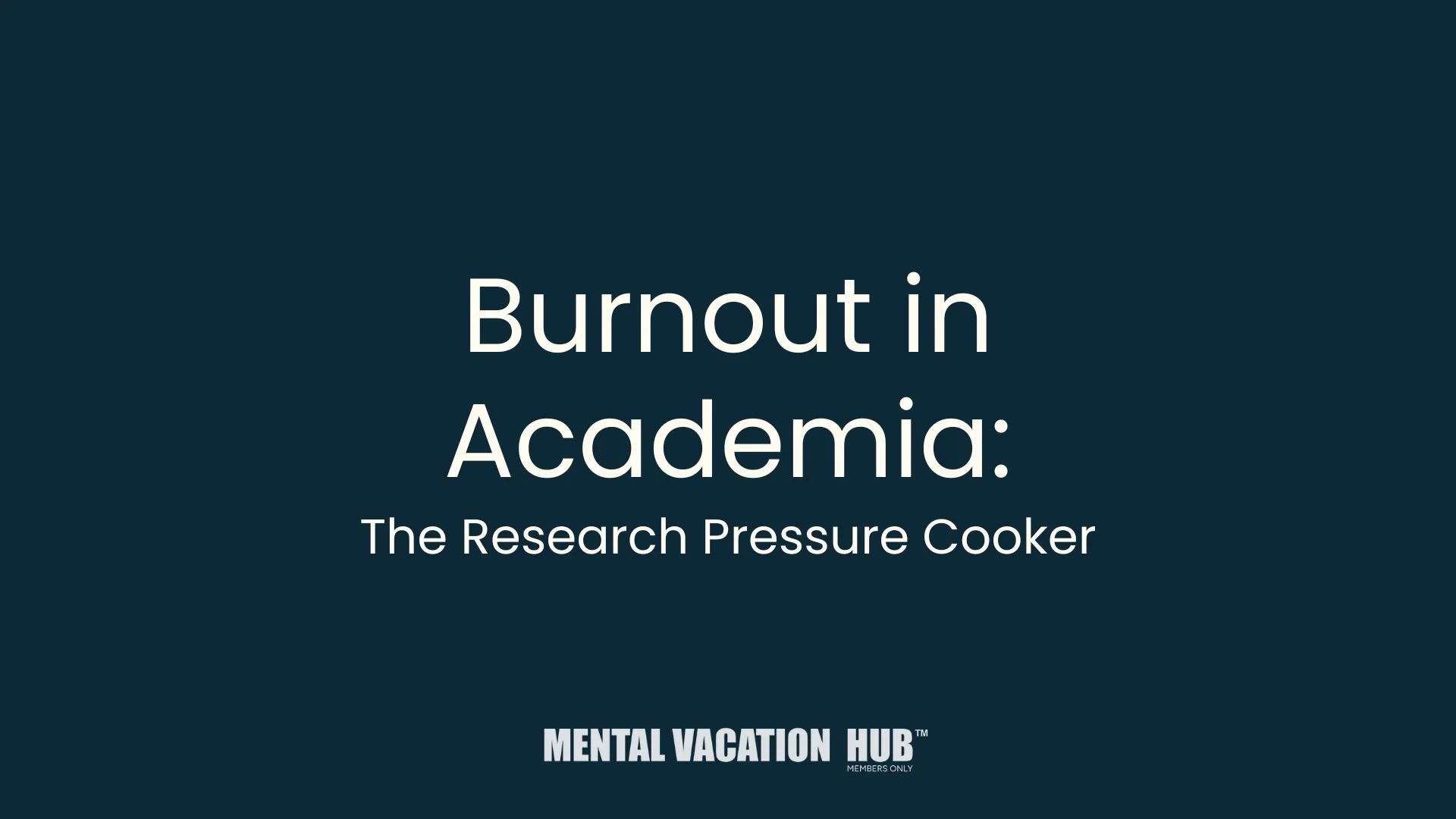Why High Achievers Burn Out: The Perfectionism Trap
High achievers burn out differently.
You do not fail because you are lazy or incompetent - you burn out because you never stop pushing, never lower your standards, and never believe your work is good enough.
Perfectionism is not a strength. It is a trap. It drives you to work harder, longer, and with less rest than anyone around you.
It makes you believe that anything less than perfect is failure. And it keeps you locked in a cycle where achievement never brings satisfaction.
I burned out after years of chasing perfection. I thought if I just worked harder, delivered more, and proved myself again, I would finally feel secure.
Instead, I collapsed. My body forced me to stop because I refused to stop myself. Such a standard story, but how else do we learn if not by trying things out ourselves? :D
This post explains why high achievers are especially vulnerable to burnout, how perfectionism fuels the cycle, and how to break free without losing your edge.
What Is High-Achiever Burnout?
High-achiever burnout is chronic exhaustion caused by relentless pursuit of excellence, unrealistic standards, and the belief that your worth is tied to your performance.
High achievers are often praised for their work ethic, discipline, and results. But beneath the success is a pattern of overwork, self-criticism, and fear of failure.
You push through exhaustion because stopping feels like weakness.
You ignore burnout symptoms because you believe you should be able to handle more.
Common traits of high achievers who burn out:
Perfectionism (nothing is ever good enough)
Overcommitment (saying yes to everything, taking on too much)
Fear of failure (avoiding mistakes at all costs)
External validation dependence (needing praise, recognition, or approval to feel worthy)
Difficulty delegating (believing no one else can do it as well)
Guilt around rest (feeling unproductive or lazy when not working)
High achiever burnout happens when working unsustainably, driven by fear and perfectionism rather than purpose or passion.
The Perfectionism Trap
Perfectionism is the belief that anything less than perfect is unacceptable.
It sounds like high standards, but it is actually a fear-based pattern that fuels burnout.
Perfectionism tells you that your worth depends on your performance.
If you make a mistake, miss a deadline, or produce anything less than flawless work, you are not just wrong. You are worthless.
This belief creates a cycle where achievement never brings satisfaction.
You reach a goal, but instead of celebrating, you immediately focus on the next one. You accomplish something significant, but you dismiss it because it was not perfect.
You work harder and harder, but you never feel like you have done enough.
The perfectionism trap works like this:
You set unrealistic standards for yourself.
You work relentlessly to meet those standards.
You achieve the goal, but it does not feel like enough.
You raise the bar higher and repeat the cycle.
Eventually, your body and mind cannot sustain the pace, and you burn out.
Perfectionism is not about excellence.
Excellence is doing your best within reasonable limits. Perfectionism is doing your best and still believing it is not good enough.
I lived this cycle for years.
Every project had to be flawless. Every email had to be perfect. Every client interaction had to exceed expectations.
I thought this was professionalism. After all, I was born under the Virgo star sign ;) It was actually self-destruction.
The Never Enough Syndrome
High achievers often experience what I call the never enough syndrome.
No matter how much you accomplish, it never feels like enough. You hit your revenue target, but you immediately focus on the next one.
You get promoted, but you worry about proving yourself in the new role. You receive praise, but you dismiss it because you know where you fell short.
This syndrome is rooted in the belief that your worth is conditional. You are only valuable if you are producing, achieving, or exceeding expectations.
Rest, mistakes, or average performance feel like failure.
Signs of never enough syndrome:
Moving the goalposts every time you achieve something
Dismissing accomplishments as "not that impressive"
Comparing yourself to others who have achieved more
Feeling guilty or anxious when you are not working
Believing that slowing down means falling behind
The never enough syndrome keeps you in a constant state of striving.
You are always chasing the next milestone, but you never arrive. This is exhausting, unsustainable, and a direct path to burnout.
I remember hitting a major business milestone and feeling nothing. I thought I would feel proud, relieved, or accomplished.
Instead, I immediately thought about what I had not done yet. That was the moment I realized achievement was not the problem.
My relationship with achievement was.
Achievement Addiction and Burnout
High achievers can become addicted to achievement.
This is not a metaphor. Achievement triggers dopamine, the brain's reward chemical. When you accomplish something, you feel good.
Over time, you start chasing that feeling.
Achievement addiction looks like productivity, ambition, and success. But underneath, it is a compulsion.
You work not because you want to, but because you need the validation, distraction, or sense of control that achievement provides.
Signs of achievement addiction:
Working compulsively, even when exhausted
Feeling anxious or restless when not working
Using work to avoid emotions, relationships, or personal issues
Defining your identity entirely by your accomplishments
Feeling empty or lost when you are not achieving
Achievement addiction leads to burnout because it is never satisfied.
You need bigger wins, faster results, and more recognition to feel the same dopamine hit.
Eventually, your body cannot keep up, and you crash.
Why High Achievers Ignore Burnout Symptoms
High achievers are often the last to recognize they are burned out.
You are trained to push through discomfort, ignore fatigue, and keep going no matter what.
You rationalize symptoms.
You tell yourself you are just tired, stressed, or busy. You compare yourself to others who seem to handle more.
You believe that if you just work a little harder or get through this project, things will get better.
Reasons high achievers ignore burnout:
Identity tied to productivity: Admitting burnout feels like admitting failure.
Fear of appearing weak: You believe asking for help or slowing down will damage your reputation.
High tolerance for discomfort: You are used to pushing through pain, so you do not recognize when it becomes dangerous.
External validation dependence: You fear that stopping will mean losing respect, opportunities, or status.
Belief that rest is earned: You think you have to achieve more before you deserve to rest.
Ignoring burnout does not make it go away. It makes it worse. By the time high achievers recognize they are burned out, they are often in stage 4 or stage 5 burnout, where recovery takes months or years.
I ignored every warning sign.
Chronic fatigue, insomnia, brain fog, and emotional numbness. I told myself I was fine, I could get through it. I was not fine and I collapsed.
I was in crisis, and I did not see it until my body forced me to stop.
How to Break the Perfectionism Trap
Breaking the perfectionism trap requires changing your relationship with achievement, rest, and self-worth.
Here is how to start.
Step 1: Recognize that perfectionism is not excellence.
Excellence is doing your best within reasonable limits.
Perfectionism is doing your best and still believing it is not good enough. You can be excellent without being perfect.
Practice finishing projects at 80% instead of 100% and notice that the world does not end.
Step 2: Redefine success.
Success is not just achievement.
It is also health, relationships, rest, and well-being. If you are accomplishing goals but destroying your health, you are not successful.
You are burning out. Redefine success to include sustainability.
Step 3: Practice self-compassion.
High achievers are often their own harshest critics.
You would never speak to a colleague the way you speak to yourself. Practice self-compassion by treating yourself with the same kindness you offer others. Mistakes are not failures.
They are part of learning.
Step 4: Set boundaries around work.
You cannot recover from high achiever burnout while maintaining the same workload.
Set clear boundaries: work hours, email limits, and non-negotiable rest time.
Protect these boundaries as fiercely as you protect your deadlines.
Step 5: Separate your worth from your work.
Your value is not conditional on your performance.
You are worthy of rest, care, and respect regardless of what you accomplish.
This is the hardest shift for high achievers, but it is the most important.
Step 6: Seek support.
High achievers often believe they should be able to handle everything alone.
You cannot. Recovery from perfectionism burnout requires support: therapy, coaching, or community. Ask for help.
Recovery is not about lowering your standards. It is about building a life where excellence and well-being coexist.
FAQ
Can high achievers recover from burnout without losing their edge?
Yes.
Recovery does not mean lowering your standards or becoming mediocre. It means learning to achieve sustainably, without perfectionism or self-destruction.
Many high achievers report being more effective, creative, and successful after recovery because they work from a place of clarity and energy, not fear and exhaustion.
How do I stop being a perfectionist?
Perfectionism is a learned pattern, and it can be unlearned. Start by practicing "good enough" instead of perfect. Set time limits on tasks to prevent overworking. Challenge the belief that your worth depends on performance. Work with a therapist or coach who understands perfectionism and burnout.
Is high achiever burnout the same as regular burnout?
The symptoms are similar, but the causes differ.
High achiever burnout is driven by internal pressure, perfectionism, and fear of failure. Regular burnout is often caused by external factors like workload, lack of control, or toxic environments.
Both require rest and intervention, but high achiever burnout also requires addressing perfectionism and self-worth.
How long does it take to recover from high achiever burnout?
Recovery depends on the severity and how long you have been burned out. Mild burnout may improve in weeks to months. Severe burnout (stage 4 or 5) can take six months to two years. Recovery requires rest, professional support, and significant changes to how you work and live.
Can I prevent high achiever burnout?
Yes.
Prevention requires setting boundaries, practicing self-compassion, redefining success, and separating your worth from your work.
Regular rest, realistic standards, and asking for help before you burn out are key. High achievers who prioritize sustainability over perfectionism are less likely to burn out.
Conclusion
High achievers burn out because perfectionism creates unrealistic standards, achievement addiction, and the belief that rest must be earned.
You push harder, work longer, and ignore every warning sign until your body forces you to stop.
But high achiever burnout is not inevitable.
You can be excellent without being perfect. You can achieve without destroying yourself. Recovery requires changing your relationship with work, rest, and self-worth.
You are not weak for burning out. You are human. And you deserve to build a life where success and well-being coexist.
You May Also Like:
Ready to recover? Get Your Burnout SOS Handbook:

Burnout SOS Handbook: Practical steps to understand, survive, and recover from your burnout. Easy to follow - just right for a brain-fogged head. Start your healing today!
Take the Burnout Test
Our 5-minute Burnout Test cuts through the confusion and gives you a personalized snapshot of where you stand and what comes next.
Start the test →




